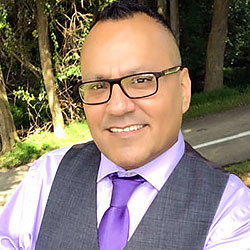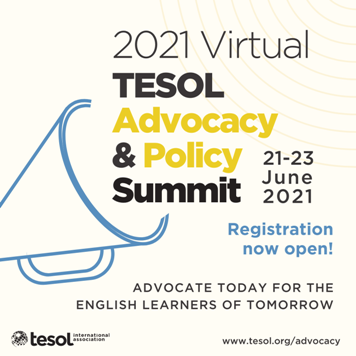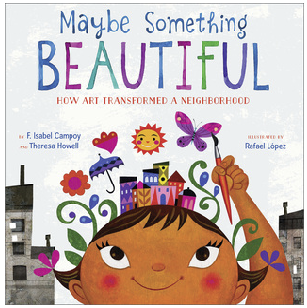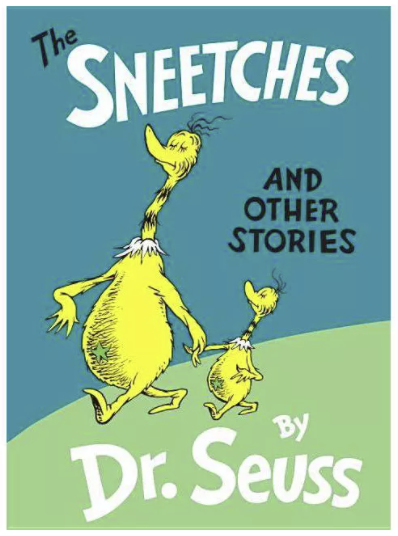NJ Teachers of English to Speakers of Other Languages/
NJ Bilingual Educators
ARTICLES – WINTER 2021
The Language of Hope– Emily Francis
English Learners Around the World
ELLs are At Risk of Becoming Invisible in the Classroom: Here’s How We Keep That from Happening– Shared by Hana Praksher
One of the Most Difficult Words to Translate
Too Much EdTech: 3 Ways to Reduce the Technology Load by Stephanie Marcotte
Website: Your Dictionary.com Examples
Dr. Jose Medina- Keynote Speaker at the 2021 Virtual Spring Conference by Sandee McBride
Anti-Racism Instruction and Language Learners
NJTESOL/NJBE Subcommittee on Countering Anti-Black Racism
Jane Hill – Keynote at the Virtual Spring Conference! by Sandee McBride
5 Steps to Ensure Students See Themselves in Instructional Content
7 Ways to Support Techquity from ELL 2.0
Quick, Low-Prep Virtual Vocabulary Activities for Any Word List
Dr. Kate Seltzer -Keynote at the Virtual Spring Conference!
2021 Virtual TESOL Advocacy & Policy Summit
Building & Utilizing Communication & Metacognitive Knowledge in Times of Covid-19 by Jasmin Warner
Valentina Gonzalez at the Virtual Spring Conference!
Will There Be Standardized Tests This Year? 8 Questions Answered
Diversifying Your Classroom Book Collections? Avoid These 7 Pitfalls
4 Ways to Co-Assess ELs with Colleagues– Shared by Hana Praksher
December 22, 2020
 The Language of Hope
The Language of Hope
Read about and watch the amazing, uplifting story of Emily Francis rising from poverty in Guatemala to a local teacher of the year being interviewed on the Ellen Show. Discover her dream, her success, and her commitment to service.
“It takes a lot of courage to expose parts of our identity. But it is often the parts of our stories that are hardest to share that make us who we are; they are what makes us real.” ~ @TaraMartinEDU #REALedu
Call for Submissions to the Annual Voices Journal:
the official publication of NJTESOL/NJBE, issued each winter
Articles include current issues, classroom explorations, program description/exemplary scheduling, and alternative perspectives as related to the teaching of English to speakers of other languages, Bilingual Education, and Dual language programs including students who are U.S.-born bilinguals, “generation 1.5”, immigrants, and international students. Included are all educational levels, from kindergarten to university, as well as on adult school and workplace literacy settings.
Submission information and form
English Learners Around the World
 These country cards include information about 19 countries including languages, conflicts, standard of living, and education system. Each card also includes linguistic features of the language(s) as well as the difficulties for those students may have when learning English.
These country cards include information about 19 countries including languages, conflicts, standard of living, and education system. Each card also includes linguistic features of the language(s) as well as the difficulties for those students may have when learning English.
Created by Training for Teachers Scholars at Southern Connecticut State University
Shared by Hana Prashker
NJTESOL/NJBE ESL Secondary SIG Representative
January 5, 2021
Teacher Voice: ELLs are At Risk of Becoming Invisible in the Classroom: Here’s How We Keep That from Happening
 Read an inspiring article about how, in spite of plexiglass barriers and masks in the classroom and for some, online learning, a teacher made connections with his students by listening to them as they shared the stories of their lives.
Read an inspiring article about how, in spite of plexiglass barriers and masks in the classroom and for some, online learning, a teacher made connections with his students by listening to them as they shared the stories of their lives.
Shared by Hana Prashker
NJTESOL/NJBE ESL Secondary SIG Representative
 One of the Most Difficult Words to Translate
One of the Most Difficult Words to Translate
Enjoy Krystian Aparta’s brief tongue-in-cheek Ted-Talk expressing the difficulties in the translation of the word you in various languages. These express cultural differences and depend on formality, gender, number of people addressed, importance of the person, whether or not it is implied from the verb, or simply omitted.
Shared by Hana Prashker, NJTESOL/NJBE ESL Secondary SIG Representative
January 12, 2021
Too Much EdTech: 3 Ways to Reduce the Technology Load
 In her blog, Stephanie Marcotte writes about preventing technology burnout and the idea that possibly less could be more.
In her blog, Stephanie Marcotte writes about preventing technology burnout and the idea that possibly less could be more.
She suggests evaluating the tech you use and if functions are overlapping, perhaps eliminating something. We may feel guilty that we are not doing enough, but decreasing a little of the technology we use and stepping away from it for a period of time may bring a feeling of better control for both teachers and students.
She also recommends giving assignments that can be completed without technology in addition to continuing to communicate with students and families to find out if they need more or less technology.
 Website: Your Dictionary.com Examples
Website: Your Dictionary.com Examples
If you need examples of anything including pronunciation, grammar, literary devices, poetry, research, and even assessment and some science, you can find it on Your Dictionary.com Examples. The website rates the examples as suitable for grades 5 through college.
There is a lot more to the site: a dictionary, thesaurus, quotes, a word finder for games such as Scrabble, Spanish to English translation, and Reference – lesson plans with links to other sites.
January 19, 2021
Dr. Jose Medina – Keynote at the Virtual Spring Conference
 We are excited to announce that Dr. Jose Medina will be our keynote for our first virtual conference this May. You can follow him on Twitter and Instagram. His motto is that, “We must be people of our word.” “Lo que se dice, se hace.” He is passionate about dual language education, biliteracy instruction, and topics dealing with anti-bias and anti-racist work. He presents professional development for several of our TESOL affiliates. More information can be found on this website: Dr. Jose Medina
We are excited to announce that Dr. Jose Medina will be our keynote for our first virtual conference this May. You can follow him on Twitter and Instagram. His motto is that, “We must be people of our word.” “Lo que se dice, se hace.” He is passionate about dual language education, biliteracy instruction, and topics dealing with anti-bias and anti-racist work. He presents professional development for several of our TESOL affiliates. More information can be found on this website: Dr. Jose Medina
This May’s virtual conference provides greater flexibility than our past face to face events. When you register, you will have access to valuable information for all three days, including the sessions kept in our “library” and all workshops for months later. No need to take time off from teaching. No need for substitute teachers. You can view all of the professional development presentations on demand at your convenience for 3 months following the conference! You will even have access to gamification for rewards.
Register now to save your place: 2021 Spring Conference Registration
More updates about our invited guests and keynotes will be seen in our upcoming newsletters.
Sandee McBride, Conference Coordinator
Anti-Racism Instruction and Language Learners
 In his blog, Empowering ELLs, Tan Huynh reiterates the main points of a podcast conversation with Dr. Maria Cioè-Peña, suggesting that teachers to reflect on the following 3 questions:
In his blog, Empowering ELLs, Tan Huynh reiterates the main points of a podcast conversation with Dr. Maria Cioè-Peña, suggesting that teachers to reflect on the following 3 questions:
- What have I been doing?
- Why am I doing that?
- How do my actions affect others?
While our motives may be good, we need to examine the messages implied in our practices.
Tan Huynh’s blog provides a practical blueprint to implementing anti-racism with our English learners.
Shared by Hana Prashker, NJTESOL/NJBE ESL Secondary SIG Representative
January 26, 2021
NJTESOL/NJBE Subcommittee on Countering Anti-Black Racism
Introduction:
From January 19th’s Weekly Voices:
Anti-Racism Instruction and Language Learners
In his blog, Empowering ELLs, Tan Huynh reiterates the main points of a podcast conversation with Dr. Maria Cioè-Peña, suggesting that teachers to reflect on the following 3 questions:
- What have I been doing? (Identify an action, a policy, a label, a process)
- Why am I doing that? (Evaluate the intentions behind the action, a policy, a label, or process )
- How do my actions affect others? (Analyze how the action, policy, label or process affects others)
While our motives may be good, we need to examine the messages implied in our practices. Tan Huynh’s blog provides a practical blueprint to implementing anti-racism with our English learners.
 NJTESOL/NJBE’s Actions:
NJTESOL/NJBE’s Actions:
In the last issue of Weekly Voices, we shared Tan Huynh’s blog on Anti-Racism Instruction and Language Learners. In June 2020, the Executive Board drafted a Statement of Solidarity against Anti-Black Racism and soon after created a Subcommittee to Counter Anti-Black Racism to ensure that this statement was not merely words, but a call to action. The subcommittee is dedicated to raising our own and the Executive Board’s awareness of how anti-Black racism impacts our work on a personal, community, and systemic level. Additionally, we aim to translate this into identifiable steps we can take within our various contexts and in our organization. In this process, we are asking ourselves the same questions that Huynh posed last week and have included some of our reflections below.
What have I been doing? The Subcommittee on Countering Anti-Black Racism has been meeting regularly to determine ways that we can best engage in individual and collective reflection and action within the Executive Board and our broader NJTESOL/NJBE community. We have been following a process of selecting readings/media, sharing these with the Executive Board, and collectively writing questions and comments based on these resources. These questions and comments are then used to record monthly NJTESOL/NJBE Critical Conversations which we share with the NJTESOL/NJBE community in our Weekly Voices newsletter and our various communications.
Why am I doing that? As an organization, NJTESOL/NJBE believes we have a responsibility to reflect on our own ideas and beliefs regarding anti-Black racism. We seek to model a process of change that begins with ourselves and moves to actionable items that impact our schools, communities and institutions.
How do my actions affect others? NJTESOL/NJBE encourages you to join us in this self-reflective work that leads to concrete action. We aim to promote greater awareness and discussion of how anti-Black racism manifests itself in language instruction. We call on educators to identify discriminatory ideas and practices rooted in anti-Black racism, both personally and professionally, and commit to taking steps to dismantle them.
Please read NJTESOL/NJBE’s Statement of Solidarity against Anti-Black Racism and watch our NJTESOL/NJBE Critical Conversations (December). We also just released our January post on the NJTESOL/NJBE hotlist; NJTESOL/NJBE Critical Conversations (January) a discussion on The Weaponization of English by Kisha C. Bryan and JPB Gerald.
NJTESOL/NJBE Executive Board Sub-Committee on Anti-Black Racism
Kathleen Fernandez, Executive Director
Caia Schlessinger, Past-President
Tasha Austin, Teacher Education Representative
Jessica Perdomo-O’Hara, Bilingual/ESL Early Childhood / Pre-K – K Representative
Anel V. de Suriel, Graduate Student Representative
Alamelu Sundaram-Walters, Representative-at-large
February 2, 2021
Jane Hill – Keynote at the Virtual Spring Conference!
 We are excited to announce that author Jane Hill will be our keynote on the second day of our first virtual conference this May. Ms. Hill is the principal consultant for Mid-continent Research for Education and Learning (McREL). Her keynote, Language and Discourse for ELLs, will provide strategies so audience members will leave the session with actionable ideas for moving their students from conversational “social” talk to more academic talk, ideas that will also work for non-EL students who need to develop their academic language. Please view her on YouTube where she speaks about the needs of beginner level ELLs. You can view the video, presented through ASCD by following this link: February 2016 EL Interview: Jane Hill – YouTube.
We are excited to announce that author Jane Hill will be our keynote on the second day of our first virtual conference this May. Ms. Hill is the principal consultant for Mid-continent Research for Education and Learning (McREL). Her keynote, Language and Discourse for ELLs, will provide strategies so audience members will leave the session with actionable ideas for moving their students from conversational “social” talk to more academic talk, ideas that will also work for non-EL students who need to develop their academic language. Please view her on YouTube where she speaks about the needs of beginner level ELLs. You can view the video, presented through ASCD by following this link: February 2016 EL Interview: Jane Hill – YouTube.
This May’s virtual conference provides greater flexibility than our past face to face events. Using your unique log-in, our platform will be able to track your time for PD hours! You will even have access to gamification for rewards. Registered attendees will have access to valuable information on demand for all three days, including the sessions kept in our “library” and all workshops for 3 months later. No need to take time off from teaching. No need for substitute teachers to cover your classes. Remember, with this new platform, you can view the professional development presentations on demand at your convenience for 3 months following the conference! Register now to save your place at this link: 2021 Spring Conference Registration – NJTESOL/NJBE
More updates about our invited guests and keynotes will be seen in our upcoming newsletters.
Sandee McBride, Conference Coordinator
 5 Steps to Ensure Students See Themselves in Instructional Content
5 Steps to Ensure Students See Themselves in Instructional Content
Randi Bender, the chief content officer at Reading Plus, states 5 possible steps that teachers and administrators can do to help students see themselves in instructional materials. These steps will help students feel that they are truly being seen and heard in school.
Shared by Barbara Tedesco, NJTESOL/NJBE Historian
February 9, 2021
7 Ways to Support Techquity from ELL 2.0
Digital Comfort Regardless of Identity, Language, Ability, or Access
 7 Ways to Support *Techquity from ELL 2.0 links to articles that include and reach beyond online learning.
7 Ways to Support *Techquity from ELL 2.0 links to articles that include and reach beyond online learning.
The list begins with suggestions for making the online experience more accessible for your students. Some are obviously necessary, such as teaching digital literacy skills, while others are not usually mentioned in lists of considerations when teaching online. One topic that is very important is how to reduce the file size for your recordings, so students can access them even on a phone.
Another item on the list is the Contrast Checker which has a link to a page about Web Accessibility for students with special needs. Especially important is suggestion five, an article about student cameras on policies.
Applicable both online and in person, the sixth topic is about using “disrupting texts” This must read presents equity as going beyond merely including diverse content in a curriculum. The final suggestion in the list provides examples for allowing ELs various means to demonstrate learning.
 Quick, Low-Prep Virtual Vocabulary Activities for Any Word List
Quick, Low-Prep Virtual Vocabulary Activities for Any Word List
The Virtual Vocabulary Activities video lists six easy vocabulary games for all age and proficiency levels. The games can be used with any type of vocabulary unit for any subject and are especially recommended for word walls. The games are creative and fun, and in 7 1/2 minutes the authors describe not just what, but how to conduct these activities as a warm-up in your online class. It is easy to see how they can be played in-person as well.
Thank you, Hana, for suggesting these lists!
February 16, 2021
Dr. Kate Seltzer – Keynote at the Virtual Spring Conference!
 We are delighted that Dr. Kate Seltzer, Assistant Professor, Rowan University, will be our keynote on the final day of our conference this May. She will be speaking on the hot topic of Translanguaging Practices of Emergent Bilinguals. Dr. Seltzer is co-author of the recent book, The Translanguaging Classroom: Leveraging Student Bilingualism for Learning with Dr. Ofelia García and Dr. Susana Ibarra Johnson and Translanguaging: A CUNY-NYSIEB Guide for Educators with Christina Celic. Her work has been published in several edited volumes as well as journals such as Research in the Teaching of English, English Education, and Language, Identity, and Education. Dr. Seltzer teaches courses at Rowan University related to bilingual education and ESL methods and culturally sustaining pedagogy.
We are delighted that Dr. Kate Seltzer, Assistant Professor, Rowan University, will be our keynote on the final day of our conference this May. She will be speaking on the hot topic of Translanguaging Practices of Emergent Bilinguals. Dr. Seltzer is co-author of the recent book, The Translanguaging Classroom: Leveraging Student Bilingualism for Learning with Dr. Ofelia García and Dr. Susana Ibarra Johnson and Translanguaging: A CUNY-NYSIEB Guide for Educators with Christina Celic. Her work has been published in several edited volumes as well as journals such as Research in the Teaching of English, English Education, and Language, Identity, and Education. Dr. Seltzer teaches courses at Rowan University related to bilingual education and ESL methods and culturally sustaining pedagogy.
Follow Dr. Seltzer on Twitter @kate_anna
This May’s virtual conference provides greater flexibility than our past face to face events. Using your unique log-in, our platform will be able to track your time for PD hours! You will even have access to gamification for rewards. Registered attendees will have access to valuable information in real time for all three days, including the sessions kept in our “library” where the workshops will be viewable for 3 months afterwards. If you cannot take time off from teaching or have substitute teachers cover your classes, you can still benefit. Remember, with this new platform, you can view the presentations at your convenience for 3 months following the conference!
2021 Virtual TESOL Advocacy & Policy Summit
 Every year, near the end of June, international TESOL, of which NJTESOL/NJBE is an affiliate, holds its Advocacy Summit. It is an opportunity for participation in advocacy at the national level. In addition to background information and strategy, attendees at this year’s summit will also be able to arrange to meet online with members of Congress or their staff. This year’s virtual event will be similar to the in-person summit two years ago, but without the Washington D.C. summer heat.
Every year, near the end of June, international TESOL, of which NJTESOL/NJBE is an affiliate, holds its Advocacy Summit. It is an opportunity for participation in advocacy at the national level. In addition to background information and strategy, attendees at this year’s summit will also be able to arrange to meet online with members of Congress or their staff. This year’s virtual event will be similar to the in-person summit two years ago, but without the Washington D.C. summer heat.
This was Jessica Hunsdon’s experience two years ago.
I attended the TESOL Advocacy Summit in June of 2019. After sessions that provided background on current legislation, I had the opportunity to meet with legislative aides from the offices of Congressman Frank Pallone and Senator Cory Booker. Prior to this summer, I had had plenty of experience calling, emailing and Tweeting elected officials, but had never scheduled or attended meetings with members of Congress. To prepare for the meetings, I was able to use resources from the training TESOL provided to draft talking points which included information about the specific legislation, how it connected to my work and impacted constituents, as well as making a specific request that the congressman co-sponsor a bill.
A week after meeting with Congressman Pallone’s aide, I received this email:
I hope you had a great weekend and thank you so much for the information! I just want to let you know that Congressman Pallone will be cosponsoring this bill. Please let me know if there are any other pieces of legislation you’d like the Congressman to join in the future and I’ll be sure to take a look at them.
Attending the TESOL Advocacy Summit provided an opportunity to better understand current legislation and how to be involved in the legislative process as a concerned constituent. It was a terrific learning experience that I continue to put into practice in advocating for policy change around issues that I care about at a local, state, and national level.
Jessica Hunsdon is the NJTESOL/NJBE Adult Education Representative.
February 23, 2021
Building & Utilizing Communication & Metacognitive Knowledge in Times of Covid-19
By Jasmin Warner I started the 2019-2020 school year in September planning, preparing, and on a mission to teach students highly effectively. In March 2020 our sense of normalcy and routine changed abruptly as students and teachers woke up to an array of emergency evacuation procedures due to Covid-19. As an English as a Second Language teacher, communication of all forms is essential to instruction with my population of students. Therefore, I emphasize to my students that communication and language skills are key components to improving literacy with vocabulary being the building block for their success in English language development. The ESL students are encouraged to communicate at all times, even if it may be difficult. I do my best work to help the ELL’s produce fully expressed thoughts from a simple head nod to chunks of phrases. It is discussed in the article Exploring Communication Strategy use and Metacognitive Awareness in the EFL classroom that metacognition impacts language awareness, and that language acquisition occurs through interaction and communication. Therefore students engage in enriching language learning activities in my ESL classroom such as “Conversation buzz”.
I started the 2019-2020 school year in September planning, preparing, and on a mission to teach students highly effectively. In March 2020 our sense of normalcy and routine changed abruptly as students and teachers woke up to an array of emergency evacuation procedures due to Covid-19. As an English as a Second Language teacher, communication of all forms is essential to instruction with my population of students. Therefore, I emphasize to my students that communication and language skills are key components to improving literacy with vocabulary being the building block for their success in English language development. The ESL students are encouraged to communicate at all times, even if it may be difficult. I do my best work to help the ELL’s produce fully expressed thoughts from a simple head nod to chunks of phrases. It is discussed in the article Exploring Communication Strategy use and Metacognitive Awareness in the EFL classroom that metacognition impacts language awareness, and that language acquisition occurs through interaction and communication. Therefore students engage in enriching language learning activities in my ESL classroom such as “Conversation buzz”.
“Conversation Buzz” is an activity where the ESL students work together after reading texts to respond to the literature, produce strong academic discussion, expand their metacognitive knowledge, and build important language and communication skills that foster success in their academic careers as well as in their everyday lives. The students follow the methodology of engaging in productive academic discussion such as respectful turn taking, active listening, and building off of each other’s responses which in return scaffolds them into deeper classroom discussion. Our classroom discussion activity “conversation buzz” is the students favorite part of the lesson and they all make “buzzing” bee sounds indicating it is time to start sharing and conversing with each other. This activity helps students process information, and increases their metacognitive abilities, as students engage in purposeful classroom discussions and work together to co-construct knowledge and negotiate meanings. Students also have an opportunity to reflect on their responses as well as the contributions of their classmates which also builds metacognition.
 In a class of intensive ESL and another class of regular ESL students, we spent every day building and using metacognitive knowledge about ourselves with each student being able to contribute their skills and knowledge, as well voices and opinions during “conversation buzz”. It is a time in the lesson where students engage in enriching learning experiences as a class and establish interpersonal and intercultural connections that make our classroom like a family. Our classroom climate is based on student centered learning and communication being regarded as a primary key to success. Therefore, when it came time for us to move from our face to face learning environment to online learning the students and parents were uneasy, yet we still needed to understand the best ways to communicate in an online platform to ensure student success.
In a class of intensive ESL and another class of regular ESL students, we spent every day building and using metacognitive knowledge about ourselves with each student being able to contribute their skills and knowledge, as well voices and opinions during “conversation buzz”. It is a time in the lesson where students engage in enriching learning experiences as a class and establish interpersonal and intercultural connections that make our classroom like a family. Our classroom climate is based on student centered learning and communication being regarded as a primary key to success. Therefore, when it came time for us to move from our face to face learning environment to online learning the students and parents were uneasy, yet we still needed to understand the best ways to communicate in an online platform to ensure student success.
With the use of many online learning platforms and Google Classroom, the ELL students were encouraged to communicate in written forms and prompted to attend weekly video conferences via Google Hangouts so that they could still receive the necessary face to face connection we were all reliant on. The parents of the English Language Learners were also present during these meetings and as a team we made strides in English Language development standards.
As educators we know parent advocacy is a vital part in students’ learning and it was warmly welcomed and highly valued during the emergency school closure, as is planning; by using significant strategies, students engaged in learning tasks online and class discussions. This created a meaningful communication centered approach to online learning and students monitored their own learning to build metacognitive skills in the new ESL online classroom. From my experience encouraging students to understand metacognitive knowledge, more specifically knowledge about themselves and their capabilities was very effective in times of COVID19. I was constantly reminding students of what they already knew about themselves and their metacognitive abilities in order to overcome challenges while learning in an online environment. For example, tenacious students were encouraged to keep trying and not give up when things were difficult to process while students who knew they normally needed a bit of extra assistance were encouraged to always ask questions when in need of clarification.
Students were able to use digital graphics, illustrations, Embedded ELL supports, Screencastify, web conferences, and other important resources to learn how to communicate effectively online. By the end of the school year ESL students were succeeding in WIDA standards and domains. The English Language Learners were able to write reflections detailing their experience in working online and share the enriching experiences we had as a class virtually. I am confident that my ESL students will continue to improve as we continue the 2020-2021 virtual school year and keep using the necessary communication skills to become top notch English Language Learners as our district’s learning model continues to change in order to protect the health of all students.
Jasmin Warner is the Intensive and regular K-2 English as a Second Language teacher at New Brunswick Public Schools. She also has a degree in communication and a minor in digital communication, information, and media from Rutgers University, and uses the same metacognitive skills that she teaches her students to focus on her strengths as an educator to improve her teaching and to ameliorate areas of anticipated student misconceptions.
References
CCSS: Five Steps to Get Students Involved in Class Discussions. (n.d.) Retrieved from: https://resilienteducator.com/
Ford, K. (2015, December 01). Communication Strategies for All Classrooms: Focusing on English Language Learners and Students with Learning Disabilities.
Retrieved from: https://www.colorincolorado.org/article/communication-strategies-all-classrooms-focusing-english-language-learners-and-students
Image retrieved from: https://unsplash.com
Knight, N. (2014, October 24) Why Are Academic Discussions So Important for Our ELLs? Retrieved from https://www.teachingchannel.com/blog/academic-discussions-ells
Mcdaniel, R. (2020, March 27). Metacognition.
Retrieved from: https://cft.vanderbilt.edu/guides-sub-pages/metacognition/
Myklevold, Gro-Anita & Bøhn, Henrik. (2018). Exploring Communication Strategy use and Metacognitive Awareness in the EFL classroom. Retrieved from: https://www.researchgate.net/publication/330534837_Exploring_Communication_Strategy_Use_and_Metacognitive_Awareness_in_the_EFL_classroom
March 2, 2021
Valentina Gonzalez at the Virtual Spring Conference!
 Valentina Gonzalez, author of Reading & Writing with English Learners: A Framework for K-5, is a former teacher who has served more than twenty years in education in her own classroom, as a district facilitator for English learners, a professional development specialist for ELs and as an educational consultant. Her work’s primary focuses have been on literacy, culture, and language. Ms. Gonzalez delivers professional development and coaches teachers on sheltered instruction strategies. She works with teachers of ELs to support language and literacy instruction. This May her workshop presentation will highlight practices that educators can use immediately in their own classrooms to increase engagement and motivation in reading.
Valentina Gonzalez, author of Reading & Writing with English Learners: A Framework for K-5, is a former teacher who has served more than twenty years in education in her own classroom, as a district facilitator for English learners, a professional development specialist for ELs and as an educational consultant. Her work’s primary focuses have been on literacy, culture, and language. Ms. Gonzalez delivers professional development and coaches teachers on sheltered instruction strategies. She works with teachers of ELs to support language and literacy instruction. This May her workshop presentation will highlight practices that educators can use immediately in their own classrooms to increase engagement and motivation in reading.
Since this year’s conference is virtual, you don’t have to choose the day or days you will attend, and if there is a workshop that you really want to see, but you cannot take that day off, the presentations will be available for you to watch for three months after the conference.
Early registration rates end on Friday night, so register now to save your place!
Contributed by Sandee McBride, Conference Coordinator
Will There Be Standardized Tests This Year? 8 Questions Answered
 Recently, Andrew Ujifusa and Sarah Schwartz published an article in Education Week that discusses what the federal government can and cannot do about testing. To start, it is important to note that the secretary of education cannot cancel tests, but he can grant a waiver to states that request one. However, even if a waiver is granted, each state must find a way to evaluate student performance. One option the department of ed does have, “…is to waive ESSA’s requirement that states use test scores to meaningfully differentiate schools and districts.” Besides this, the article states that teacher generated evaluations are better for determining learning loss than standardized tests.
Recently, Andrew Ujifusa and Sarah Schwartz published an article in Education Week that discusses what the federal government can and cannot do about testing. To start, it is important to note that the secretary of education cannot cancel tests, but he can grant a waiver to states that request one. However, even if a waiver is granted, each state must find a way to evaluate student performance. One option the department of ed does have, “…is to waive ESSA’s requirement that states use test scores to meaningfully differentiate schools and districts.” Besides this, the article states that teacher generated evaluations are better for determining learning loss than standardized tests.
There are also issues of validity, technical resources, and privacy with remote testing, but safety concerns must be addressed for in-person testing. The authors also discuss fairness, instruction time, and the need to prove the need for more resources.
March 9, 2021
Diversifying Your Classroom Book Collections? Avoid These 7 Pitfalls
 The author of this article, Kara Newhouse, tells how to build a library collection that is truly diverse.
The author of this article, Kara Newhouse, tells how to build a library collection that is truly diverse.
Building a classroom library that offers “windows, mirrors and sliding glass doors” to all children is more than a numbers game. It requires thoughtful curation of who is represented and how.
Along with 50 recommendations from picture books to young adult stories, Kara Newhouse proposes these guidelines.
Books should portray diverse protagonists that have adventures, fall in love, and live lives in which identity is not an issue. However, the authors should not merely change the characters’ skin color. Books should have characters that are complex and multifaceted, and are written not necessarily by well-known authors, but also by those who share life experiences that are similar to those of their readers. Finally, teachers are urged to not only diversify their library, but also to look at their textbooks, and then find other sources that promote diversity.
Read about the pitfalls and get the book list.
Article found by Hana Prashker, ESL Secondary Rep.
 A Time to Learn
A Time to Learn
From the controversy over racism in Dr. Seuss’ books, there is a lesson for us, who, as described by Dr. Philip Nel in an interview for Esquire about cancel culture, are steeped in racist culture, and as benefactors of white supremacy, are unaware of its influence.
Looking back at Theodore Seuss Geisel’s writing through our present day lens, this influence becomes clear. While some of his early books were racist, Seuss also wrote an essay criticizing racist jokes, and two anti-racist books, “Horton Hears a Who”, and “The Sneetches”. Besides these, “during the Second World War, he did cartoons that were explicitly critical of Jim Crow laws. At the same time, those World War II cartoons have grotesque caricatures of Japanese Americans and of the Japanese.” His intentions seem good, but the cultural bias was insidious.
How can I, and how can we become aware of our own biases? NJTESOL/NJBE has started the Critical Conversations, and you are invited to join in.
March 16, 2021
4 Ways to Co-Assess ELs with Colleagues
 As a proponent of co-teaching, rather than the traditional the pull-out or push-in models, Tan Huynh describes the position of the ESL language specialist differently by stating that, “Our role is to collaborate with colleagues to make assessments equitable and engagement possible for language learners.”
As a proponent of co-teaching, rather than the traditional the pull-out or push-in models, Tan Huynh describes the position of the ESL language specialist differently by stating that, “Our role is to collaborate with colleagues to make assessments equitable and engagement possible for language learners.”
The method for doing this is to work with the content teachers, to use the assessments they have prepared for the class and scaffold them with cognates, sentence frames, images, and other means to co-create a template that can be used by any student who needs support.
This also includes co-writing rubrics so the content can be mastered through creative and carefully structured scaffolds. The goal is to maintain the rigor of the assessment while providing equity, so that ELs can demonstrate their grasp of the subject. After each of the first few assessments have been completed, Huynh recommends that the EL specialist work with the content teacher evaluating the assessments so that the feedback that both teachers give the student is consistent.
5 Techniques to Support English Learners in Mathematics
 In this Quick Tip, Wanda J. Ramirez-Suarez suggests that the problem of low scores for ELs in math classes can be solved by implementing these five strategies.
In this Quick Tip, Wanda J. Ramirez-Suarez suggests that the problem of low scores for ELs in math classes can be solved by implementing these five strategies.
- Help students understand the vocabulary of the math goals by providing synonyms for complex terms.
- Give ELs sentence starters for discussions about the math problems.
- Connect the mathematical symbols to the most common expressions used in explaining mathematical processes.
- Include language structures in the math lessons.
- Present math concepts in several different ways.
She concludes that, “By supporting students in owning their learning, teachers can help them make their own connections as they embrace the process of gaining not just procedural knowledge but deep conceptual understanding.”
Both articles recommended by Hana Prashker, ESL Secondary Representative
 Visit our home page for links to past and present Voices issues.
Visit our home page for links to past and present Voices issues.
